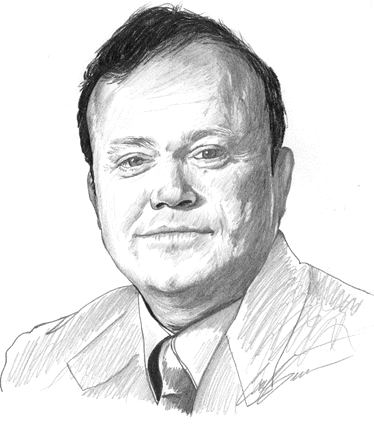INTERVIEW
by Thom Hartle

ILLUSTRATION BY CARL GREEN
Our faith in our ability to make superior choices is like water is to fish. But when we see that the path doesn't work, suddenly we feel like a fish out of water. Every aspect of our culture supports the conventional way of investing. But the facts don't support the conventional way of investing. -- James O'Shaughnessy
So how did you start out, anyway?
I started out like everyone else, wanting to know why a stock went up or down. I would watch with surprise when the price of story stocks, where the prospects for the company was the best thing since sliced bread, would tumble, despite the glowing recommendations for it. At the same time, I would see stodgy, old-line industrial companies such as Goodyear Tire rallying several hundred percentage points.
What did that indicate to you?
I figured that it wasn't the underlying story of the company that was important. Early on, I believed that the way the stocks moved had to have some sort of underlying symmetry.
So you believe that it wasn't a random walk?
I just did not believe that the market was efficient.
How so?
If you agree that trading is frictionless and investors are rational, and if you agree that everyone has a homogeneous interpretation of the information, then stock markets are efficient.
Why?
People have a heterogeneous response to information. One piece of information that leads one investor to buy will lead another to sell. People simply are not rational in their approach to the stock market. So the central tenets of the efficient market theory did not make sense.
And when was this?
Back in 1979. At that time, if you were interested in any research, you would have found that it was all done by academics, and it was all saying that the stock market was efficient.
And your observations didn't agree?
I did not believe that the efficient market theory accurately explained the way the markets worked. So I started reading everything available on the stock market. And, of course, all roads there eventually lead to Benjamin Graham. Ben Graham was the grandfather of a systematic approach to selecting stocks. He came up with the idea that we should systematically look not at the individual stories of stocks, but rather, the underlying variables of the companies. I was immediately drawn to that approach.
One piece of information that leads one investor to buy will lead another to sell. People simply are not rational in their approach to the stock market.Excerpted from an article originally published in the October 1998 issue of Technical Analysis of STOCKS & COMMODITIES magazine. All rights reserved. © Copyright 1998, Technical Analysis, Inc.